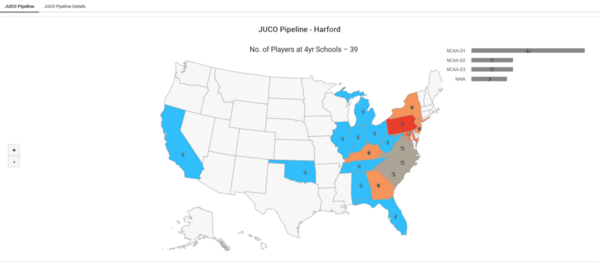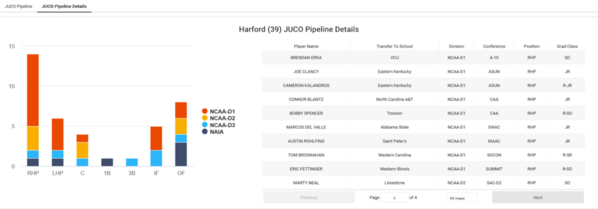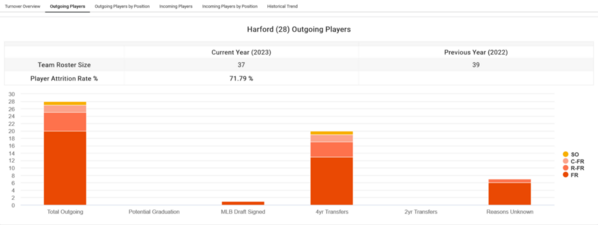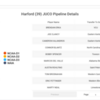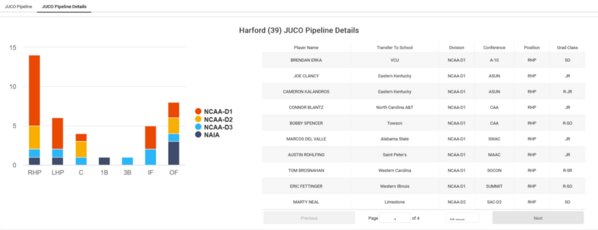Replies sorted oldest to newest
I can't speak for any JuCo's in the northeast, but you might find what schools have baseball programs from the NJCAA website.
UConn Avery Point is a JuCo with a historically good baseball program. Bunker Hill CC (MA) has a very well connected coach. He moved there a couple of years ago to rebuild the program. Gloucester CC (NJ) is a good program. One of the posters here has a son who went there. I'm not well versed in JuCos. I just know of these three from knowing kids who attended.
My son went to Gloucester CC junior college in southern New Jersey as RJM mentioned. He went there because of the reputation of the program and the coach. They are a D-3 juco that goes to the world series every year. Many of their players are 4 year D-1 guys who don't have the grades or didn't like the situation at there 4 year schools.
The program and coach's reputation get these players. The reputation also brings out the 4 year school recruiters. Most of the starters each year go on to play at D-2 and D-1 schools. Four of last year's players are now playing at Lynn in Florida and one was drafted in the 7th round. My son is playing his second year at Newberry College in SC.
You have to be a pretty good player to start at Gloucester. The coach almost turns over the roster yearly. He brings in players in the middle of the year and is always looking for the best available players.
I can second the vote for Avery Point. Great baseball history, and part of the UConn system so good academically.
I live in South Jersey and Gloucester County College id exactly as fillsfan mentioned. Top Juco program. pro prospects out of hs that go to D1 and have it not work out wind up there.
If you want warmer weather check out spartanburg Methodist in South Carolina. D1 juco with very good program.
Would anyone update or add to this list now?
The only Juco in New England I've ever heard of as far as their baseball program is NECC. Northern Essex Community College. But that's a reputation built on maybe 20 years ago. I'm not sure how the program is rated now.
A way to find out about the influence of JuCos in an area is check area D1 rosters and where the former JuCo players came from. Most players play within 100-200 miles of home.
Many of the kids in the New England area do a post grad year at a private prep school. I'd imagine that eats into the number of Juco programs up there.
@K9 posted:Many of the kids in the New England area do a post grad year at a private prep school. I'd imagine that eats into the number of Juco programs up there.
I am curious about this. Can you say more?
Like, why would a post grad year be popular in one area of the country but not others? Is it weather? The fact that more PG programs exist there? Do HS/club coaches encourage? Do colleges recommend it for certain players? Is it because the cutoff age for kindergarten is later in the Northeast so many HS grads are younger than their counterparts elsewhere?
Thanks.
My guess is there are more of these private schools in the northeast than other areas, but that is just a guess.
When I played Ivy football many years ago about 10% of the players had been post grads at Andover, Deerfield, BB&N, etc. It was common during recruiting for a coach to advise a kid who was on the border academically to do an extra year. In my recollection the financial aid was generous for athletes.
More recently, when my son played for a travel team in New England I saw that parents were very strategic about the use of these schools. Many times kids wait to see what offers they are getting as juniors and then transfer to do senior year plus a grad year to extend the recruiting window. We even know a kid who started at public school, transferred to a private school, accepted a great offer as a sophomore and then transferred back to public school.
Worth mentioning that these schools are very prestigious academically and probably enhance a kid's chances of acceptance at any college.
If you want to significantly reduce your time by more than 70%, then you might want to check out CBI JUCO Pipeline Dashboard.
You can look at historical trends as far back as 2017.
In totality, CBI is more accurate with respect to transfer data than the 1700 individual school's website
As the 2024 season starts and the spring rosters of the 4yr schools are available, CBI will publish and reconcile all transfers.
Currently, the 2024 JUCO Pipeline insights are based on 2023 fall rosters, for those schools that published their rosters, we've cleaned them up by finding who transferred in.
This includes:
NCAA-D1 - 288 of 305 schools
NCAA-D2 - 219 of 250 schools
NAIA - 138 of 196 schools
We've published NCAA-D3 - 123 of 386 schools, they normally don't record where players transfer from, thus we have to hunt for the answers. We are holding off on reconciling until next month.
Northeastern schools normally published their rosters late february/early march
@SpeedDemon posted:I am curious about this. Can you say more?
Like, why would a post grad year be popular in one area of the country but not others? Is it weather? The fact that more PG programs exist there? Do HS/club coaches encourage? Do colleges recommend it for certain players? Is it because the cutoff age for kindergarten is later in the Northeast so many HS grads are younger than their counterparts elsewhere?
Thanks.
There are big regional differences with many things but none more than with JuCo baseball. In warm weather states the level of JuCo baseball is just way better than in the Northeast. That has to have a lot to do with it.
@adbono posted:There are big regional differences with many things but none more than with JuCo baseball. In warm weather states the level of JuCo baseball is just way better than in the Northeast. That has to have a lot to do with it.
We (P5) scrimmaged a NE juco "power" one fall. After the first few arms there wasn't anything too impressive. It was pretty lopsided game. Other son's school (competitive mid major) scrimmaged them the next year and it was a similar result. We were pretty good but nowhere near a top 25 team. Top NE jucos probably resemble a strong D3, lower level D1 program.
I think a lot of the regional differences have to do with the general snobbish attitudes towards jucos in the NE. Obviously there is more talent in the southern states where a combination of quantity of talented players, less D2s/D3s, and a more tolerant attitude towards college choice make such a difference in the level of the schools in different regions.
@PABaseball posted:We (P5) scrimmaged a NE juco "power" one fall. After the first few arms there wasn't anything too impressive. It was pretty lopsided game. Other son's school (competitive mid major) scrimmaged them the next year and it was a similar result. We were pretty good but nowhere near a top 25 team. Top NE jucos probably resemble a strong D3, lower level D1 program.
I think a lot of the regional differences have to do with the general snobbish attitudes towards jucos in the NE. Obviously there is more talent in the southern states where a combination of quantity of talented players, less D2s/D3s, and a more tolerant attitude towards college choice make such a difference in the level of the schools in different regions.
The important question is "Does the JUCO have a good pipeline?"
For the 2023 season, Harford (D1 Region 20) had 39 alumni at 4 yr school(s).
19 were on NCAA-D1 Rosters
20 players from their 2022 team moved on to 4 yr schools
Attachments
Thanks for sharing CBI. How many positions players?
@2022NYC posted:Thanks for sharing CBI. How many positions players?
The graph is broken down by division and position.
Ack sorry I missed that
@CollegebaseballInsights posted:The important question is "Does the JUCO have a good pipeline?"
The school I'm referring to will send the majority of their kids to lower level D1s, mostly D2s. Which is why I would probably put them in the same realm as a very competitive D3 or a lower level D1 team.
The lack of kids going to higher profile schools is also what makes me skeptical they would be able to hang with the traditional juco powers like Chip, McLennan, and the others.
@PABaseball posted:The school I'm referring to will send the majority of their kids to lower level D1s, mostly D2s. Which is why I would probably put them in the same realm as a very competitive D3 or a lower level D1 team.
The lack of kids going to higher profile schools is also what makes me skeptical they would be able to hang with the traditional juco powers like Chip, McLennan, and the others.
IMHO, it is not about hanging with the traditional powers from other regions. The question was specific to Northeast, whereas they are competitive and they have a pipeline.
The pipeline does not have to be to a P5, but are they moving student athletes to the next level.
The challenge of the northeast schools is the limited number of D1 Jucos. E.g RCSJ-Gloucester and RCSJ-Cumberland are D3, that should move at least to d2 and be a feeder system to some of the D1 schools, e.g Delaware
@CollegebaseballInsights posted:IMHO, it is not about hanging with the traditional powers from other regions. The question was specific to Northeast, whereas they are competitive and they have a pipeline.
The pipeline does not have to be to a P5, but are they moving student athletes to the next level.
The challenge of the northeast schools is the limited number of D1 Jucos. E.g RCSJ-Gloucester and RCSJ-Cumberland are D3, that should move at least to d2 and be a feeder system to some of the D1 schools, e.g Delaware
I don't disagree with anything you're saying.
But good and competitive is subjective - the schools mentioned are good and competitive for their region/division but would not be as competitive on the overall national scale. D3 Juco National champ ≠ D1 juco champ. If there is going to be a thread of competitive programs you need to add context
@PABaseball posted:I don't disagree with anything you're saying.
But good and competitive is subjective - the schools mentioned are good and competitive for their region/division but would not be as competitive on the overall national scale. D3 Juco National champ ≠ D1 juco champ. If there is going to be a thread of competitive programs you need to add context
Agree. My belief is @Francis7 was looking at the regional aspect, and hopefully understand their pipeline.
As for it is known NE is mostly D2 and D3 jucos.
My son had a great 2 years at Harford Community College in Bel Air Md.
Went to juco world series and a bunch of teammates ended up continuing at D1, D2 and D3 schools.
Best of Luck in your search
@Spunker22 posted:My son had a great 2 years at Harford Community College in Bel Air Md.
Went to juco world series and a bunch of teammates ended up continuing at D1, D2 and D3 schools.
Best of Luck in your search
Last year there were 39 players at 4 yr schools
On another note, In 2014, Harford had a very interesting recruiting process, a d1 program that functioned like a d2 from scholarship perspective.
Players would need to get housing before enrolling in school. Students would get the in-district tuition price and the school would pay for books.
Attachments
My son lived in apartment a few miles away with 2 other teammates. Very safe and convenient especially since he had no vehicle in Maryland.
Most players were from MD, NY, NJ AND PA.
Like I said fantastic experience after Covid nightmare in SEC.
@Spunker22 posted:My son lived in apartment a few miles away with 2 other teammates. Very safe and convenient especially since he had no vehicle in Maryland.
Most players were from MD, NY, NJ AND PA.
Like I said fantastic experience after Covid nightmare in SEC.
Yes, we looked at the school when my son was being recruited. Great facilities.

